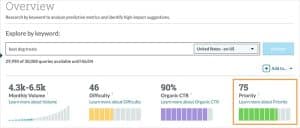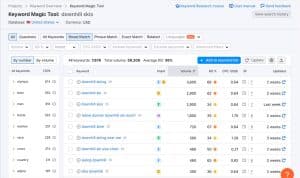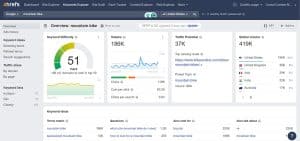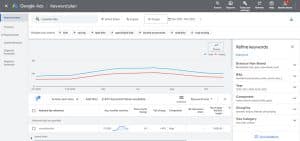Tech
5 Most advanced keyword research tools to be used in 2024
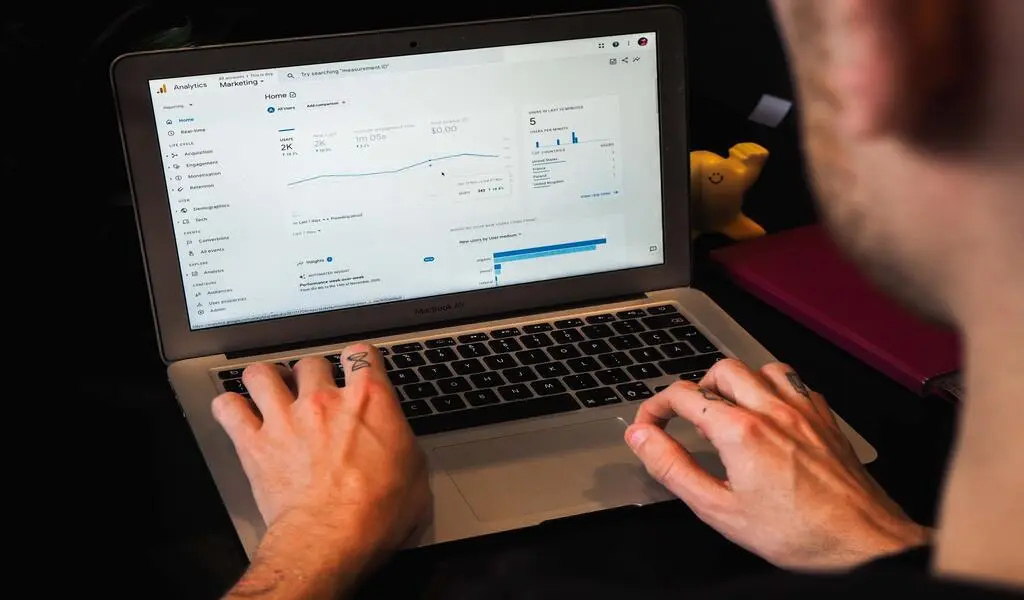
Probably 12 different answers if you ask a dozen digital marketers what keyword research tools they use. If you’re familiar with these platforms, you’ll understand why such a wide range of opinions exist. Every keyword tool has its features and varies in how deep the data is.
For your SEO strategy to work, you need a reliable keyword researcher to help you determine what your customers are searching for. Despite the many options on the market, how do you pick one that meets your business’s needs and budget?
Here are 5 keyword research tools to help you climb the SERPs and stay in the search engine spotlight.
Short List of Keyword Research Tools
We compared keyword tools based on ease of use and metrics. We’ll then discuss each platform’s pros, cons, and intricacies to ensure it’s right for you.
-
Moz: Best overall
-
Semrush: Best for user intent analysis
-
Ahrefs: Best for keyword tracking and analysis
-
QuestionDB: Best for long-tail keywords
-
Google Keyword Planner: Best for paid advertising keywords
The Science Behind Keyword Research
Because each tool collects and processes data differently, metrics like search volume, difficulty, and page authority will vary.
Tools scrape the web for data, including:
-
Search engine results pages
-
Autocomplete suggestions
-
Google’s related searches and People Also Ask
-
Google Trends and Google Keyword Planner
-
Forums and social networks
-
Clickstream data tracks user movements
The best ones also inspect top-ranked pages for content, keyword frequency, and backlinks. Artificial intelligence can help interpret this data, pinpointing patterns that can help you gain ground.
Using different data sources and processes, each platform magically turns big data into the metrics you see on your screen.
It’s best to compare keywords within a tool, not across platforms. If you wanted to choose between “picture frames” and “wall art” on Ahrefs, you wouldn’t look at metrics on Ahrefs or Semrush. However, you can be sure comparisons run on a single platform are accurate.
Although each tool reported a different number, Andrei Prakharevich found that “mountain bikes” were the most popular and “gravel bikes” were the least popular, which is key to choosing a keyword.
Essential Features for Keyword Research Tools
We’re going to put together a keyword tool wish list. Ideally, you want a large database of keyword ideas and reliable metrics so you can decide what to target.
Some essential features include:
-
Keyword suggestions: A robust tool provides many keywords. Some use Google, YouTube, Amazon, and other search engines. If you’re trying to run an international business, check out a platform that lets you search by language and region.
-
Search volume: There’s no getting around this metric. Search volume tells you how many times a keyword has been searched. It doesn’t make sense to rank for keywords that aren’t popular.
-
Keyword difficulty: Based on the strength of the pages currently ranking, this metric shows how hard it is to rank for a low- to medium-difficulty keyword. Keywords with low- to medium-difficulty can help you get more visibility while you tackle more competitive terms.
-
Search intent: It is important to match your content to the user’s expectations. Some tools tell you a keyword’s search intent, such as navigational, commercial, informational, or transactional.
-
Competitor analysis: Compare competitor keywords to your own to ensure you don’t miss any opportunities. You can use some tools to see how your competitors rank and what backlinks they’ve built.
-
Website authority: Depending on the tool, this is also known as domain authority, domain rating, or authority score. It reflects the overall credibility of a website based on factors like backlinks.
Some platforms have other features, like site audits, on-page SEO recommendations, and content creation tools, but they’re not covered here.
5 Advanced Keyword Research Tools for 2024
No matter if you’re a small startup or an enterprise, we think these keyword research tools are worth your time. We’ve got free and paid options, from basic to comprehensive solutions. You might find one or two free tools that meet your needs. Please take advantage of free trials and give it a shot.
1. Moz Keyword Explorer
Best Overall
Intro to the Tool
Moz’s Keyword Explorer offers a wide range of metrics in an easy-to-navigate format. Our favorite part is its proprietary Priority Score, which helps you find keyword opportunities without getting bogged down with numbers. A paid subscription also gives you rank tracking, site crawls, on-page optimization, link research, and custom reports. Keyword Explorer is free but limited in scope.
Special Features Highlight
Moz throws you a lifeline if you’re drowning in data when analyzing keywords. It considers factors like search volume, keyword difficulty, and opportunity and creates a Priority Score. The Priority Score helps you figure out keywords that have good ranking potential. As Rand Fishkin explained, a Priority Score of 80 indicates high demand, moderate difficulty, and few SERP features detracting from organic search. Some of these factors contribute to lower scores.
Pricing
-
Free for 10 keyword queries
-
Monthly subscriptions range from $99 to $599
2. Semrush
Best for User Intent Analysis
Intro to the Tool
Semrush’s breadth is hard to beat. The platform has more than 55 tools, including keyword research, site audits, PPC, backlinking, and website optimization—it’s an end-to-end digital marketing tool. You can start with free tools like Keyword Magic and Keyword Overview, but they come with a price.
Special Features Highlight
Keywords aren’t the only thing you need for SEO. You need to understand why people use that keyword so you can create content that meets their needs. Are they looking for a deal, a deal, or learn something? You’ll see these tags on the Keyword Results page in the Search Intent column. Semrush uses an algorithm to mark up keywords as having navigational, informational, commercial, or transactional intent. Plan content by grouping keywords with the same intent.
Pricing
-
Free account with limited queries
-
7-day free trial
-
Monthly subscriptions range from $129.95 to $499.95
3. Ahrefs
Best for Keyword Tracking and Analysis
Intro to the Tool
Ahrefs is a leading search optimization tool, often grouped with Moz and Semrush. It’s great for tracking analytics and performance. It’s great for keyword research, link building, competitor analysis, content creation, and website audits.
Special Features Highlight
Ahrefs’ dashboard lets you monitor site performance by pulling key metrics from various sources.
Click specific boxes to see the details behind the report and adjust your SEO strategy as needed. You can also monitor changes in your site health, domain rating, organic keywords, backlinks, and traffic.
Pricing
-
Monthly subscriptions range from $99 to $999
4. QuestionDB
Best for Long-Tail Keywords
Intro to the Tool
By pulling data from forums where users answer each other’s questions, QuestionDB provides long-tail keywords in the form of questions.
Special Features Highlight
Using QuestionDB, you can spy on how your audiences chat naturally around a topic, which aligns perfectly with the conversational style of voice and Google’s SGE.
Due to their specificity, question keywords have a lower search volume. However, they’re less competitive and can help you reach highly qualified, niche audiences with precise search intent. Build topic clusters and establish expertise with QuestionDB.
Pricing
-
Free plan (up to 60 questions and no data)
-
$15/month Solo Plan (100 searches per month)
-
$50/month Agency Plan (500 searches per month)
5. Google Keyword Planner
Best for Paid Advertising Keywords
Intro to the Tool
Since the data comes directly from Google, SEO specialists also use this tool to drive organic traffic. Keyword Planner helps advertisers pick relevant keywords and estimate their ad spend. In your Google Ads account, you can find Keyword Planner in the Tools menu. Although it has limited features, it can help you find lucrative keywords and key themes you can use to build topic clusters.
Special Features Highlight
You can find keywords with high commercial intent using Keyword Planner, even though it doesn’t identify search intent. You’ll find which keywords advertisers will pay top dollar for, so you’re more likely to get lucrative traffic. Sort the keyword results by “Top of Page bid (high range).
Pricing
-
Free with a Google Ads account
The Future of Keyword Research
Although you’ll need a good keyword research tool (or two), there’s one thing to remember. Google sent us down this path with its helpful content system that prioritizes useful information. Modern SEO is moving from keyword-centric to user-centric.
That means you still need to know your primary keyword but don’t have to fit lists of semantic keywords into your content as much. Search engines often don’t rely on exact keyword matches anymore because they’re so good at understanding context.
The value of keyword research is to figure out what your audience wants to know about a topic and in what format. In other words, you aren’t relying on keywords but themes. You must put in some effort, assess the competition, and create charts, videos, FAQs, and other content to satisfy your audience.


